#Lilune
Explore tagged Tumblr posts
Text
Lucifer : Could you guys at least try to see this from my perspective?
Charlie : *crouches down*
Lilith : *kneels down*
Necro : *sits on the floor*
Lucifer :
Lucifer : I hate all of you.
#Hell family#hazbin hotel#kaya & co#hazbin hotel oc#oc#kaya & co hazbin hotel#hazbin hotel lucifer#hazbin hotel lilith#hazbin hotel charlie#lucifer morningstar#charlie morningstar#lilith morningstar#Necro#Hazbin hotel Necro#Lilune#lucifer and charlie#lucifer x lilith#lilifer#Lucifer and Necro#Lilith and Necro#Charlie and Necro#lilith x lucifer#Lilith X Lucifer X Necro
67 notes
·
View notes
Text


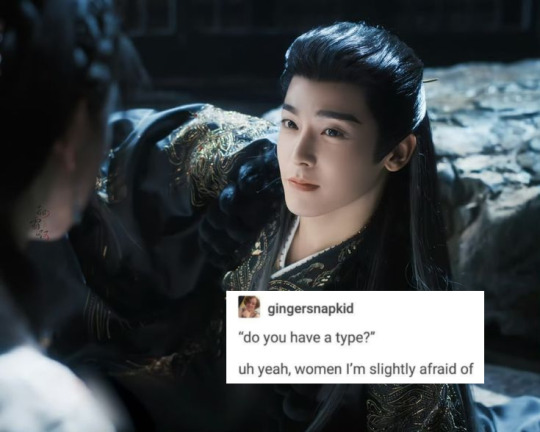


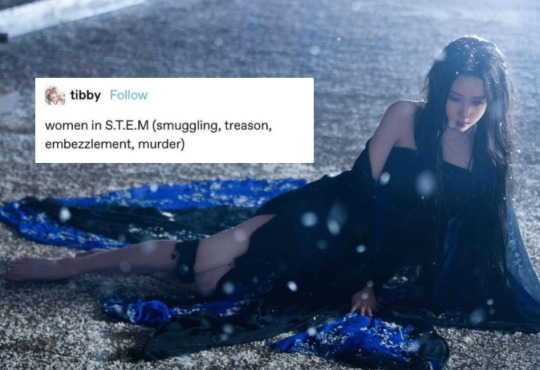

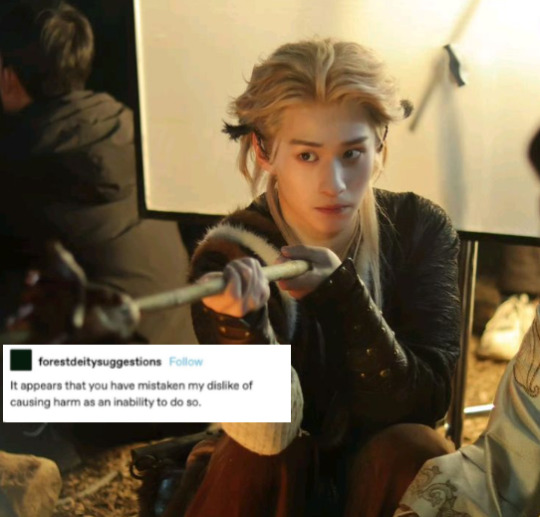


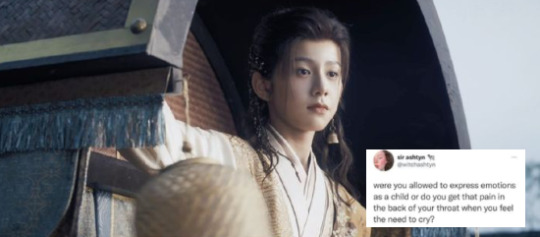
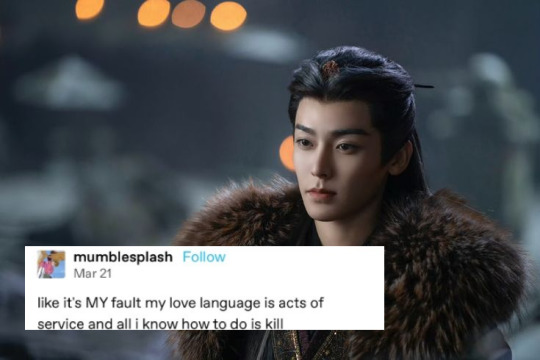
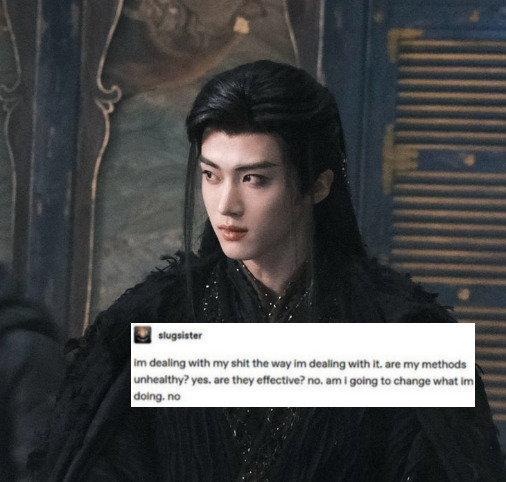

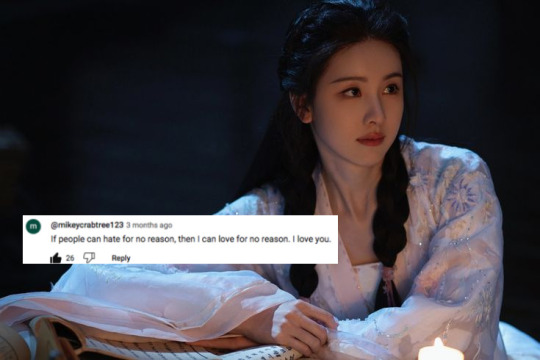
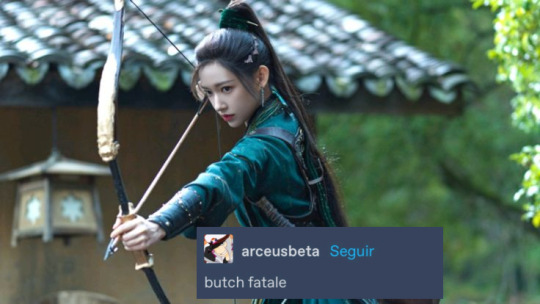

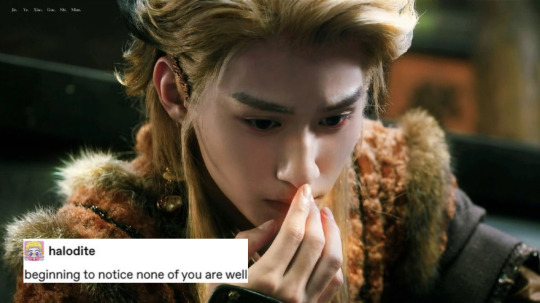
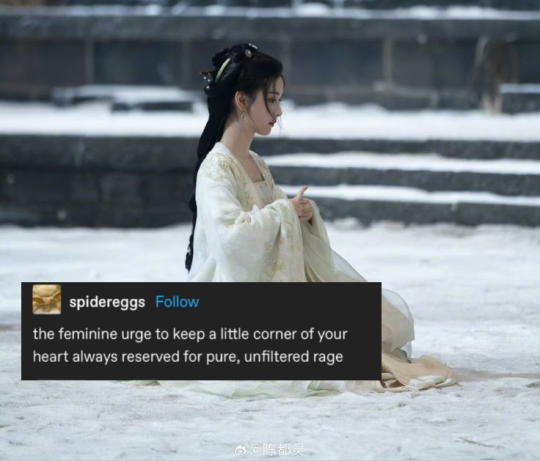
#fangs of fortune#text posts#mine!#yes the whole process of this was 2 hours#but i had fun#zhao yuanzhou#zhuo yichen#pei sijing#wenxiao#lilun#bai jiu#ying lei
148 notes
·
View notes
Text
RE: the absolute fascination (and adoration) I have with the symbolism of Zhu Yan's and Li Lun's weapons, how it reveals their respective characterisations and the discussion of humanity


There are so many aspects that I love about FoF but I still believe how the show represents LiYan's relationship + worldview through their weapons is one of the best uses of visual storytelling and literary/visual devices I have seen in recent years. (long text ahead!)
A Gift and A Curse
Where did their complications start? The exchange of gifts. Why do we gift another presents? For affection. It's so ironically simple, free of malice and at its basis so, so human. For a demon like Li Lun who claims to not understand humans, he reciprocates the moment of kindness Zhu Yan shows him - the rattle to make him happy, and him giving Zhu Yan the umbrella to shelter him from rain.
There is something so beautifully ironic about two great demons eventually using ordinary, human household objects as their weapons. And items given to each other at that. When they first receive them, both the umbrella and rattle are just simple objects with no meaning attached to it, except for the goodwill of friendship. There is no inherent ill-intention and it is pure. Yet.
Li Lun ultimately only understands reciprocation, and not truly the innate kindness and affection which Zhu Yan demonstrates. Zhu Yan gave Li Lun the rattle to have him understand why he finds humans wonderful: Can any of our demonic powers have the ability to make someone happy just like this rattle does for a child? Li Lun gives Zhu Yan the umbrella because Zhu Yan gave him the rattle and made him happy. Li Lun understands the action, and does not grapple with its underlying intentions. He consistently struggles with this throughout the story, especially when actions do not match up with the speaker's reasonings.
Dissonance in character is an extremely human trait, and the understanding of this is where Zhu Yan and Li Lun’s stories and similarities diverge. Zhu Yan on one hand, understands the complexity of humans and is at terms with it. Li Lun on the other hand, never understands the ability to be complex and paints humanity black. Their gifts are still turned into weapons that will eternally curse them of their once-there closeness, because of each other and their inability to reconcile their ideologies. How they use the umbrella and rattle from here on, represents their differences in their views of humanity.
Double Edged
When watching any fantasy/wuxia/xianxia cdrama, everyone who is written as a fighter usually has an offensive weapon used and made for injuring and killing. But not when it comes to Zhu Yan and Li Lun - they are two individuals who will certainly be masters in weaponry if they wielded a sword or blade. But they don’t.
In the Wilderness, from what we see, none of the demons use weapons. Even Cheng Huang uses an hourglass. Both Li Lun and Zhu Yan do not own any weapons before gifting each other the rattle and umbrella, and these aren’t even supposed to be used as weapons. There is such an underlying innocence to demons that instead of choosing a blade to take as a weapon, they choose these essentially harmless items instead. Though, this innocence ends here. The concept of weapons is a human creation. The concept of making an item specifically just to harm others is an especially human conception. By adopting the identity of weapons onto their gifts, the multifaceted nature of weaponry and thereby humanity seeps into their characters. Weaponry is both ironically and ironically human, and their weapons represent both sides of human nature that Zhu Yan and Li Lun believe in.
A weapon is only causes harm in one's hands if you make command it to. Do you protect or do you do harm with it? I find it so telling and intriguing that Zhu Yan and Li Lun run off in either directions with the purposes of a weapon. Zhuyan has always been fascinated by the human world versus Lilun having apathetic views of the human world, and they reflect this in how they use their weapons.
Zhu Yan uses his umbrella to always shield his team, protect and deflect harm, while the harm he inflicts on others comes from his innate spiritual energy (one word spells). He protects this simple umbrella and preserves its goodness, indirectly making sure to not sully the goodness of humanity. Instead, he chooses to use himself as the offensive weapon. On the other hand, Li Lun turns his rattle into an offensive weapon, changing its tip into a dagger. Before it is destroyed, all his attacks are summoned from strikes against the rattle. He doesn’t care, and humanity is trash, therefore he treats this object of innocence with irreverence and violence.
Though, there still is Li Lun’s favourite question: Is it better to be a demon or human? He chooses human. Which at the very least, is interesting.
Who You Wish To Be
The thematic concern of LiYan's relationship is very much defined by this question they often pose or have been asked by others: Is being a human or a demon better?
On an even deeper level, the juxtaposition between Li Lun's use of the rattle and what he says, being a human is better, is even more encompassing of his character — driven, conflicted obsession. The same way he keeps trying to break Zhuo Yichen and Zhuyan, but manages to maintain somehow civil and emotional conversations with them, his treatment of his rattle but the fact he thinks being human is better, and his one-time statement “maybe the human world is interesting after all” are contradictory. He is never at peace with himself and cannot accept things the way they are. He is very much a child, misguided and believing that things are one-dimensional (all humans are bad, Zhuyan how could you hurt me for them) while things in reality are complex. Even his best intentions, from his line “I, Li Lun, will never run away from things (…)” is innocently one dimensional. He will never be the human he wants to be until he comes to terms with this. And most importantly, it's not even about being human. It's never about titles or names, it's about who he wants to be. Li Lun once again is fixated on surface levels that he doesn't grasp the depth of reality.
"Whether one is a human or demon, it's only a matter of titles. Just be whoever you want to be." - Zhu Yan, Ep 26.
Zhu Yan is the stellar opposite of Li Lun. He doesn’t sully Li Lun’s gift to him and uses it the way Lilun initially gave it to him for: to protect. And his answer to the Demon or Human question as written above is telling of his character, compared to Li Lun's set-in-stone answer. But despite everything, what makes everything so tragic is what started it in the first place: affection. One keeps that affection as a weapon to spread the same to others, while the other keeps and weaponises that affection to regain it all back.
Just like how he uses his rattle to relentlessly pursue revenge, Li Lun is so insistent on what should have been, that he doesn't see what can be, and it curses him. Zhu Yan sees the possibilities of everything, wants to protect the good, and it curses him. Perhaps its this inevitability of their separation and also the sliver of hope that they can reconcile, trapped in their shared respective curses, that troubles them deep down.
-
Their weapons symbolise both their ideologies, and serve as physical reminders of their intertwined past. Regardless of how they use their weapons, they use a reminder of the other as defense and offense against the world. A diverged path still has met once before. The sharpest blade is still one crafted from the torment of memory.
On Visual Story-Telling
The use of these unusual objects in c-drama land as weapons is such a stroke of genius on the production team and writers' part. It gives so much more flavour and uniqueness to these characters instead of the usual sword or spear. Such small, precise, details with large implications on characterisation.
#fangs of fortune#大梦归离#the use of these props make my visual design#+ author heart so happy#the team rlly cooked#yes im calling them liyan#i havent checked ao3 for the ship name#liyan is a nice name#the most tragic aspect is that lilun is misguided and blinded#he is more an antagonist than villain#he doesn't want the end of the world#he wants zhuyan back#literally a fucking kid#this is turning into a lilun apologist blog
96 notes
·
View notes
Text


THE⠀CONCEPT
────── ✧・゚: ✧・゚: ✧・゚: ✧・゚:
AND This Pair....

#fangs of fortune#qi rong#tian jiarui#yan an#still not over this photo 🔥🔥#Lilun finally found his partner ✨#li lun#cdramasource#cdrama#zhuo yichen
49 notes
·
View notes
Text
I love being in the stage of my life where for birthdays and holidays my sister and I just gift each other increasingly heavy sets of dumbbells
4 notes
·
View notes
Text
the options are: do you want death? or do you want pain
29 notes
·
View notes
Text
LOTF HEADCANONS YEAHHHHHHHHHHHHHJ
( this is 4 @jackmerrizzler btw :3 )
( also sum of these are old )
Jack tried putting face paint on ralph multiple times but ralph kept running away everytime he did
Ralph went like "if you kept doing that im going to break your spear" ( he was buffling )
When it would be Halloween time they would dress up in a group costumes to find each other easily ( Sam & Eric would get lost pretty quick )
Speaking of halloween, its rogers fav holiday
Simon owed cats back home ( 2 to be specific )
Jack's full name name is "Jackson" merridew but prefers his last name more because his first name reminds him too much of his dad ( he's a junior )
After the island Ralph's hair wasent as fluffy anymore ( it became sorta dead in a way )
Jack's favorite color is green
After piggys aunt learned about piggy's death she made a candy about him & named it after him
They tried getting fish one time on the island but they were scared of how much they flopped on land that they resorted to pig
After a lot of the boys were rescued they slept with nightlights
Before crash landing on the island Jack's mom was pregnant ( jack didnt know at the time ) and while of his time on the island she ended up being born ( totally didn't headcanon this onto jack because I have a baby sister myself )
The liluns would gift each other things they found around the island ( like lil rocks or seaweed ) for comfort
( older ) Ralph would visit piggy's tombstone
The bigguns & lilnuns would write letters to their parents despite half of them getting lost
Jack knows how to play the piano
After jack got recued he was kinda paying less attention in choir and got put in dance classes for a while as punishment
Ralph had band classes back home and knew how 2 play the trumpet & flute ( totally didn't headcanon this bc I have a band class & play the flute and get heartburn and stomach aches all the time while playing it )
( IF SIMON WAS STILL ALIVE. ) he would have asked his mom for a lizard a bunch of times after being rescued until his grandma bought him 1 for his birthday !! :D
During the feast, Jack asked Ralph if he wanted to dance with him, and ralph just fucking straight out said "no"
After a few a minutes had past ( like 20 or so ) Ralph asked roger if he had seen simon cuz he wanted to dance with him
Ralph named 2 of his horses after simon & piggy
𝓙𝓪𝓬𝓴 𝔀𝓻𝓲𝓽𝓮𝓼 𝓵𝓲𝓴𝓮 𝓽𝓱𝓲𝓼
Ralph, piggy & Simon made flower crowns 4 each other ( Simon made the most for the 2 of them )
Jack tried teaching a lilnun C# but eventually gave up after a few mins 🥲
Jack would ( on purpose ) practice his C# late at night and drive Ralph CRAZY
Jack would try to teach some of the choir his fav songs
Jack HATED the rain while his time on the island but got used to it after he got saved
One of the boys on the island said sum shit like: "I can't believe I'm gonna die here without my first kiss!" As a joke ( WHICH MOST OF THE KIDS UNDERSTOOD ) except 1 kid who thought he was being serious and ACTUALLY KISSED HIM... ( in front of jack too )
Out of all the boys on the island simon had the most scars ( even after getting murdered ) with jack being the second & Ralph being the 3rd
piggy & simon tried giving sum of simons flower crowns to the tribe but they destroyed them due to "jacks orders"
This post took an hour 2 type pls like it ☹️ ( I'll pin this maybe )
43 notes
·
View notes
Text
So, about this exchange:



He greets him like that, but then ZYZ:




Ouch? </3 haha...
I know Lilun made the wrong choices, BUT look at him. His "so you haven't changed your mind..." expression there makes me think that deep down, he hoped ZYZ would reconsider his anger towards him after not seeing him for so long, but no... poor thing just missed his best friend!
#AND of course it was the same for ZYZ. he does tell him something like 'after all this time [locked] you haven't changed [learned]' haha#and we also have lots of moments where ZYZ looks at LL with those puppy eyes like asking him 'please stop with all this'#i mean. for ZYZ is something we see him hoping throughout the whole drama#but yeah#if my former best friend called me scumbag I'd also be plotting something haha#first rewatch thoughts#fangs of fortune#li lun#zhao yuanzhou#gosh i love this drama
42 notes
·
View notes
Text
i really hope they get stuck in whatever size they finished the first session. i know that probably won't happen bc it messes up the reach (lizzie couldn't put any blocks down and the liluns were so hard to get), but it would be so funny
22 notes
·
View notes
Text
the inconstant design is my fault tbh I keep breed changing her lmao


I draw this girl too much and her design keeps changing rip
I would like to mention that her skin accent thing has like two other heads that I retroactively fused into the will o wisps lol
21 notes
·
View notes
Text
[Fangs of Fortune]Zhaoyuanzhou & Zhuoyichen & Lilun // Beautiful Mess //...
youtube
9 notes
·
View notes
Text
Lilith : You're a lying piece of shit!
Lucifer : Oh yeah? You're the idiot that thinks you can get away with everything you do, WELCOME TO THE REAL WORLD!
Lilith : I'm leaving and I'm taking Charlie and Necro with me!
Necro, gathering cards : And that's enough Monopoly for today.
Charlie : :(
New oc for you ;)
#Hell family#hazbin hotel#kaya & co#hazbin hotel oc#oc#kaya & co hazbin hotel#Necro#hazbin hotel lucifer#hazbin hotel lilith#hazbin hotel charlie#Kid Charlie#monopoly#hazbin hotel incorrect quotes#incorrect quotes#crack#lilith x lucifer#Lilith X Lucifer X Necro#Lilune#charlie morningstar#lucifer morningstar#lilith morningstar#Charlie and Necro#Hazbin hotel Necro#new oc
38 notes
·
View notes
Text
not like i care or anything. LIKE I DONT CARE ONE BIT REALLY.
but. the
... the way the makeup artist lifted up his chin. ..
#fangs of fortune#zhao yuanzhou#zhu yan#hou minghao#fangs of fortune bts#*buries face in arms* i#honestly i get lilun like omg i wouldnt want this guy out of my sight either
72 notes
·
View notes
Text
Hou minghao interview snippet about yanan
7 notes
·
View notes
Text
lilun best boy they could never make me hate you
13 notes
·
View notes
Text

The Beautiful Girl Sleeps In A Sea Cockleshell by Lilun
71 notes
·
View notes